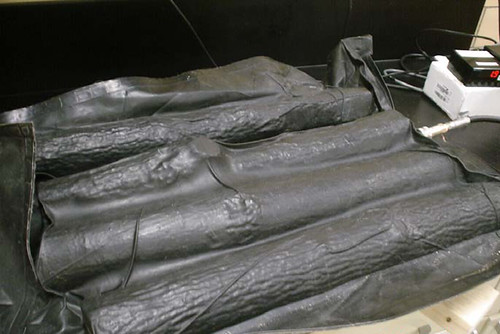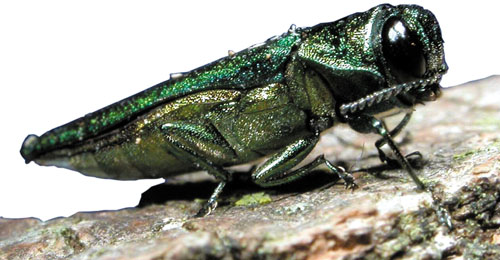
Ash logs undergoing vacuum treatment to kill emerald ash borer larvae. (U.S. Forest Service)
The shiny green one-half-inch-long, one-eighth-inch-wide emerald ash borer has destroyed tens of millions of ash trees in the U.S. since the beetle’s discovery in 2002 in Detroit.
The real Ash trees comprise around seven percent of the trees in eastern U.S. forests. In urban areas, ash trees make up about 50 percent of street trees.
Ash trees are important both economically and ecologically. A wide array of products are made from ash wood, including baseball bats, tool handles, pool cues, furniture, cabinets, oars, and acoustic and electric guitars. Ash seeds are an important food source for birds, mice, squirrels, and other small mammals. Ash trees also provide essential habitat for cavity nesting birds, such as woodpeckers, owls, and wood ducks.
However, great care must be taken so that ash wood infested by emerald ash borer is not transported to un-infested areas. In order to reduce the spread of emerald ash borer and similar invasive insects, sanitation procedures have been established to help reduce the spread of forest pests.
Current USDA Animal and Plant Health Inspection Service treatment standards require ash firewood to be heated to a core temperature of 140 degrees Fahrenheit for a minimum of 60 minutes. To explore an alternative heat treatment option, researchers at Virginia Tech investigated the effectiveness of using a vacuum and steam treatment to kill the insect in ash firewood. Having an effective treatment would allow people to transport ash firewood outside of existing quarantine zones.
“This effort focused on working with a variety of partners to reduce the spread of invasive insects through firewood transportation by exploring, testing and demonstrating a new heat treatment system that meets current regulatory requirements, but has the potential to reduce energy consumption, save time and save money,” said Steve Milauskas, director of the Forest Service’s Wood Education and Resource Center.
Dr. Zhangjing Chen, professor in the Department of Sustainable Biomaterials at Virginia Tech, demonstrated the effectiveness of a vacuum/steam treatment for ash firewood infested with emerald ash borer. The demonstration grew out of earlier studies that showed a vacuum/steam treatment as an effective means to kill insects, molds, fungi, and nematodes in green and dry hardwood pallets and green pallet parts (stringers).
Researchers gathered ash firewood known to be infested with emerald ash borer at Cacapon Resort State Park in West Virginia, then transported it in a 10-foot by 11-foot air-tight, water-tight container to facilities at West Virginia University in Morgantown that had the capacity to provide an adequate supply of steam. Treatment of the samples took less than five hours.
After treatment, researchers inspected the firewood for live insect larvae and compared the results with control samples left at Cacapon Resort State Park. All emerald ash borer larvae in the treated samples were dead. In contrast, the control samples contained live insect larvae.
Treatment using a vacuum and steam process has several advantages over other treatment methods. Preliminary studies indicate that vacuum/steam treatment cycles take less than half the time of current hot air treatment methods alone; energy consumption was also 25 percent less. In addition, this demonstration showed that this process can effectively treat irregularly shaped materials such as firewood.
You can help stop the spread of emerald ash borer by learning more at USDA’s Stop the Beetle.

The emerald ash borer is a non-native, wood-boring insect. (USDA photo)
No comments:
Post a Comment